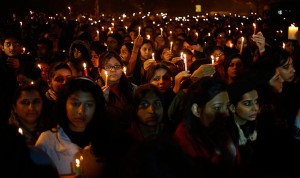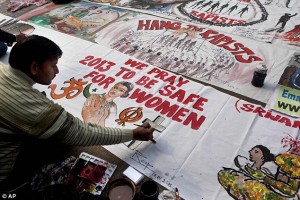The horrific gang rape of a 23 year old medical student in Delhi last month has once again brought a number of serious societal and gender issues to the fore in India. The young girl from Singapore, who later died in hospital from the injuries she sustained, has inspired a wave of angry protest across the country.
 Over the last decade, there have been numerous shocking rapes reported in India. These range from incidents in a suburban Mumbai train to one on campus at Delhi University at the historical monument of Khooni Darwaza. The victims were not all young students either – they ranged from a Swiss diplomat at an international film festival to a hospital nurse who later had her eyes gouged out. The issues at hand are far from being isolated ones affecting a small minority. They are telling signs of a disease that seems to have a stranglehold on the nation.
Over the last decade, there have been numerous shocking rapes reported in India. These range from incidents in a suburban Mumbai train to one on campus at Delhi University at the historical monument of Khooni Darwaza. The victims were not all young students either – they ranged from a Swiss diplomat at an international film festival to a hospital nurse who later had her eyes gouged out. The issues at hand are far from being isolated ones affecting a small minority. They are telling signs of a disease that seems to have a stranglehold on the nation.
According to local women’s groups, there is at least one rape every hour in India. Females belonging to lower castes and those from tribal origins face the highest risks in terms of abuse. It is sad that these statistics, which are anything but hidden, are only raising public fury following the death of this young lady with a promising future. Many incidents of rape in villages and small towns are quite plainly ignored. The lack of recourse for victims and even worse, the lack of acknowledgement that they are in fact victims has caused the ugly status quo to persist.
As in the case of the Arab Spring, social media played a significant role in raising the profile of a particular occurrence. In Tunisia, the self-immolation of Mohamed Bouazizi marked the turning point that was to upset an unacceptably unjust status quo there. Similarly in India now, the likes of Facebook and Twitter are helping fuel the protests, hopefully to the extent of achieving a lasting outcome on issues that have been swept under the carpet for far too long.
The call for tougher Indian rape laws have been around for a long time. With every publicised incident, awareness of women’s issues has increased. Unfortunately this awareness, in terms of India’s public administration at least, has not resulted in much, if any, alleviation for women. Sexual harassment is rife in India and the conviction of rapists is extremely difficult under the current legislation. The demands by activist groups for rape laws to be modernised has largely been futile to date. Law makers and corrupt politicians have all but stagnated in response to women’s activist groups.
 Delhi, in particular, is said to have one of the highest rates of crime against women in India and this is very much where the protest is currently focused. This gang-rape straw that will potentially break the camel’s back has resulted in vocal calls for the death penalty against rapists. Indian politicians have been caught on the back foot and still no leader has come out with a clear stance and proposed action plan on how to handle this and future such incidents. In fact, there has barely been any interaction, let alone reassuring of the protesting masses, that appropriate action will be taken.
Delhi, in particular, is said to have one of the highest rates of crime against women in India and this is very much where the protest is currently focused. This gang-rape straw that will potentially break the camel’s back has resulted in vocal calls for the death penalty against rapists. Indian politicians have been caught on the back foot and still no leader has come out with a clear stance and proposed action plan on how to handle this and future such incidents. In fact, there has barely been any interaction, let alone reassuring of the protesting masses, that appropriate action will be taken.
So, what is it that needs to happen here? Firstly, this wave of aggressive public protest needs to grow and grow until the government is forced to take positive action, if only to appease the masses. If it remains in the territory of a social media trending flavour of the month, the situation will just dissipate and India will need to wait for another such atrocity in order to get all riled up. Updating Facebook profile and BBM photos with a supportive candle, and forwarding related email chains is simply not enough. Such feel-good tokens are akin to play lottery and hoping that’s done enough to resolve all your financial concerns. The real question here is whether the Indian public, and particularly women, have what it takes to fight for what they believe is right. This is an opportunity second to none to take a stand and force a much-needed change in India.
Loading ...
If all this Delhi rape news is too much for you to handle, then perhaps this would be a good time to try some alternative online entertainment. Click here to play some online casino games or visit these country guides to gamble online for real money. Stay tuned for the full B24 report on the legality and future of online gambling in India later this month.